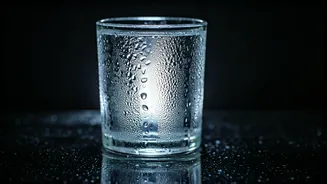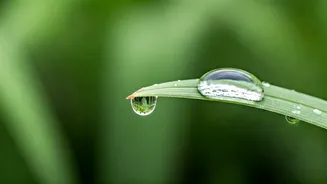Water Absorption Dynamics
The efficiency with which our bodies absorb water is a fascinating process. Contrary to the common practice of quickly downing large quantities of water,
the body often struggles to use it optimally. Drinking water slowly and steadily, throughout the day, may prove to be the most advantageous method. This is because the body can process the water gradually, ensuring it’s properly distributed and utilized within the cells. Moreover, various personal factors, including one's overall health and the type of physical activities undertaken, can significantly impact how efficiently the body absorbs water. Understanding these factors is important for making informed choices regarding how we hydrate ourselves to support overall health.
Sipping vs. Gulping
The age-old question of whether to sip water steadily or gulp down large amounts at once is a key aspect of hydration. Sipping water throughout the day can assist with consistent hydration levels, allowing the body to use the water efficiently and effectively. Conversely, drinking large volumes of water quickly may result in some of the water passing through the system before the body can fully absorb it. This can lead to an inefficient use of the liquid and potentially cause discomfort. Slow, methodical hydration supports better absorption and minimizes the strain on the kidneys, which filter the excess water. The right hydration strategy supports better overall health and wellness.
Time to Hydrate Fully
How long it takes for the body to fully hydrate after drinking water is another critical factor. While it varies from person to person, on average, the body may take from a few minutes to several hours to achieve complete hydration. This timeline is affected by the volume of water consumed, the state of the individual's hydration at the time of drinking, and the speed at which the body can process the water. Drinking water slowly allows for gradual absorption into the bloodstream, which is then used by the various bodily functions. This process underscores the significance of maintaining a consistent drinking schedule rather than relying on infrequent, large water intake sessions.
Factors Affecting Absorption
Several factors impact how well the body absorbs water. These include a person's level of physical activity, their overall health, and their dietary habits. Active individuals may lose more water through sweat and need to replenish fluids more frequently. Similarly, certain medical conditions can affect the body's ability to retain and use water efficiently. Dietary considerations, such as the consumption of electrolytes through foods or drinks, also play a role in water absorption. Electrolytes, like sodium and potassium, help to balance fluid levels in the body, which then supports the hydration process. Thus, understanding these factors helps in tailoring one’s hydration approach to suit their specific needs.
Hydration Habits Matter
The conclusion of the discussion highlights the importance of thoughtful hydration practices. Regular, moderate water intake is preferable to infrequent, large water consumption. Considering individual circumstances, such as health status and activity levels, will help people develop a more personalized approach to drinking water. Understanding how to optimize hydration allows the body to function properly, supporting various bodily functions and contributing to overall health and wellness. Making conscious, informed decisions about how and when to drink water will pay big dividends in the long run.





















